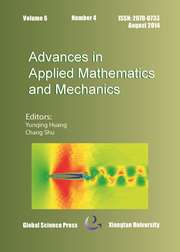No CrossRef data available.
Article contents
Explorations and Expectations of Equidistribution Adaptations for Nonlinear Quenching Problems
Published online by Cambridge University Press: 03 June 2015
Abstract
Finite difference computations that involve spatial adaptation commonly employ an equidistribution principle. In these cases, a new mesh is constructed such that a given monitor function is equidistributed in some sense. Typical choices of the monitor function involve the solution or one of its many derivatives. This straightforward concept has proven to be extremely effective and practical. However, selections of core monitoring functions are often challenging and crucial to the computational success. This paper concerns six different designs of the monitoring function that targets a highly nonlinear partial differential equation that exhibits both quenching-type and degeneracy singularities. While the first four monitoring strategies are within the so-called primitive regime, the rest belong to a later category of the modified type, which requires the priori knowledge of certain important quenching solution characteristics. Simulated examples are given to illustrate our study and conclusions.
Keywords
- Type
- Research Article
- Information
- Advances in Applied Mathematics and Mechanics , Volume 5 , Special Issue 4 , August 2013 , pp. 407 - 422
- Copyright
- Copyright © Global-Science Press 2013
References
 , Publ. Res. Inst. Math. Sci., 10 (1975), pp. 729–736.CrossRefGoogle Scholar
, Publ. Res. Inst. Math. Sci., 10 (1975), pp. 729–736.CrossRefGoogle Scholar



